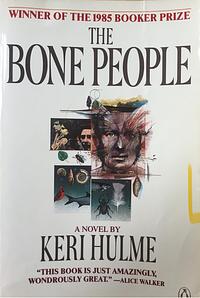Take a photo of a barcode or cover
Wow. I'll be thinking about this book for a long long time.
adventurous
challenging
emotional
informative
mysterious
reflective
sad
medium-paced
Plot or Character Driven:
A mix
Strong character development:
Complicated
Loveable characters:
Yes
Diverse cast of characters:
Yes
Flaws of characters a main focus:
Yes
I had to go get drunk after reading this. A long, poetic, slightly-heavy-but-not-quite read that broke my heart, one way or another
challenging
dark
emotional
reflective
slow-paced
Plot or Character Driven:
Character
Strong character development:
No
Loveable characters:
No
Diverse cast of characters:
Complicated
Flaws of characters a main focus:
Yes
Hulme does an outstanding job of exploring the intricacies of domestic abuse. This novel is really an extended character study of three highly complex individuals, and Hulme’s prose style is lyrical and unusual. I’m glad I’ve read this, but it was a long and harrowing read.
challenging
dark
slow-paced
Plot or Character Driven:
Character
Strong character development:
No
Loveable characters:
No
Diverse cast of characters:
Yes
Flaws of characters a main focus:
Yes
adventurous
challenging
dark
slow-paced
Plot or Character Driven:
Character
Strong character development:
Complicated
Flaws of characters a main focus:
Yes
Challenging and beautiful, I have so many thoughts about this one. I loved Kerewin as a character, wealthy owner of a Tower, making dandelion wine, and I have mixed feelings about the others. The writing is just beautiful and poetic despite dark themes of abuse, alcoholism, violence. It was a really gripping book that I'll keep thinking about.
4.5. So much going on in this book from sadness, isolation, misunderstanding, violence and ultimately family. The characters are stubbornly hard to love but you kinda end up loving them anyway. Fascinating look into Maori culture and into New Zealand. I'm not going to say it was enjoyable but I'm happy to have read such a great read.
In her isolated tower along the coast of Te Waipounamu, Kerewin is a reclusive creature devoted to self-earned comforts. Fortunate in matters of monetary gain, she whiles away her days fishing, painting, strumming away at the guitar, and dabbling at all manner of hobbies that would do an introvert proud.
Her self-imposed solitude is one day disturbed in the form of a sopping-wet boy named Simon who quickly worms his way into her heart. Wiser than his age and bearing scars visible and invisible, the mute Simon and his father Joe quickly become an integral part of Kerewin’s life. The trio bond over their status as individuals of mixed Māori-European ancestry, the fractured familial relations that have left them adrift in various ways, and the unexpected love they find in one another that inserts new meaning into their lives.
The everlasting controversial topic of the book however remains the discovery that Joe is abusing Simon, brutally and nearly fatally, a topic Hulme examines without restraint, and presents in an unabashed morally-grey light often familiar in narratives written by authors of color. It came as no shock to me that many of the critics vocally deriding this book did so from the perspective of white communities who tend to ignore, speak softly, or address in silos the implications of violence within homes, while authors like Alice Walker gave it praise.
Hulme presents it as a multidimensional issue – one that has causes, and consequences, and can exist in a world where people love their abusers, hate them, provoke them, fear them, fight them, and flee from them all at once. Joe is both terrible, and pitiable. Simon is a victim, yet it is understandable why he loves his father. Kerewin is so unfamiliar with love in general that as a childfree woman with no close family or romantic history, she is given no credit for not knowing how to handle the situation.
More than that, Hulme’s writing of Kerewin – a character representative of herself – as an asexual woman and her relationship with Joe helped bring understanding and also such a profound note of beauty to a dynamic that was spelled out so sensibly in a world where such representation is often lacking.
The biggest flaw found in this book comes as most great books do: its ending. Like many great works Hulme seemed to run out of steam and race to the finish line, shoving everything together in a way that could have been cathartic, but instead came off as rushed. The book offers a truly beautiful ending, done somewhat of a disservice by wrapping up what should have taken a chapter or two in a few pages.
This book made me feel in a way all great books do. It brought up painful memories, and also an even more profound appreciation for a culture that lacks significant exposure in the Western world. R.I.P Keri Hulme, and thank you now and forever for such a beautiful and brilliant work.
Her self-imposed solitude is one day disturbed in the form of a sopping-wet boy named Simon who quickly worms his way into her heart. Wiser than his age and bearing scars visible and invisible, the mute Simon and his father Joe quickly become an integral part of Kerewin’s life. The trio bond over their status as individuals of mixed Māori-European ancestry, the fractured familial relations that have left them adrift in various ways, and the unexpected love they find in one another that inserts new meaning into their lives.
The everlasting controversial topic of the book however remains the discovery that Joe is abusing Simon, brutally and nearly fatally, a topic Hulme examines without restraint, and presents in an unabashed morally-grey light often familiar in narratives written by authors of color. It came as no shock to me that many of the critics vocally deriding this book did so from the perspective of white communities who tend to ignore, speak softly, or address in silos the implications of violence within homes, while authors like Alice Walker gave it praise.
Hulme presents it as a multidimensional issue – one that has causes, and consequences, and can exist in a world where people love their abusers, hate them, provoke them, fear them, fight them, and flee from them all at once. Joe is both terrible, and pitiable. Simon is a victim, yet it is understandable why he loves his father. Kerewin is so unfamiliar with love in general that as a childfree woman with no close family or romantic history, she is given no credit for not knowing how to handle the situation.
More than that, Hulme’s writing of Kerewin – a character representative of herself – as an asexual woman and her relationship with Joe helped bring understanding and also such a profound note of beauty to a dynamic that was spelled out so sensibly in a world where such representation is often lacking.
The biggest flaw found in this book comes as most great books do: its ending. Like many great works Hulme seemed to run out of steam and race to the finish line, shoving everything together in a way that could have been cathartic, but instead came off as rushed. The book offers a truly beautiful ending, done somewhat of a disservice by wrapping up what should have taken a chapter or two in a few pages.
This book made me feel in a way all great books do. It brought up painful memories, and also an even more profound appreciation for a culture that lacks significant exposure in the Western world. R.I.P Keri Hulme, and thank you now and forever for such a beautiful and brilliant work.
Beautiful and terrible and uplifting and heartbreaking all at once. I was completely drawn in, although some parts were very hard to read (Joe..) I was a little taken aback by the ending, which seemed a little too pat. Knocking off half a star for that, so 4.5...



